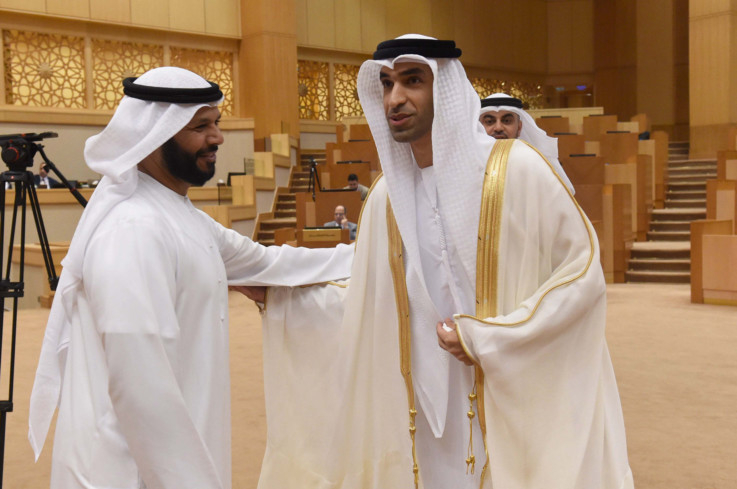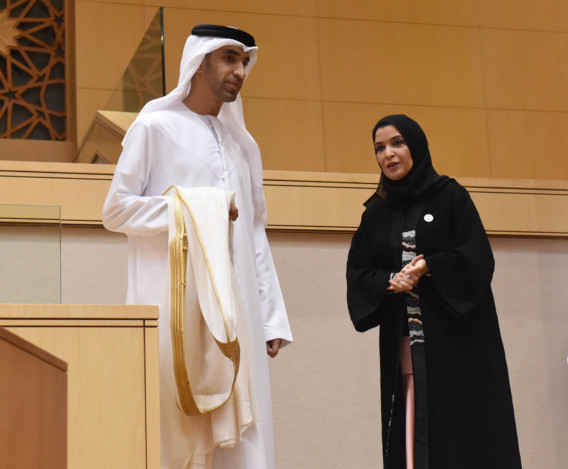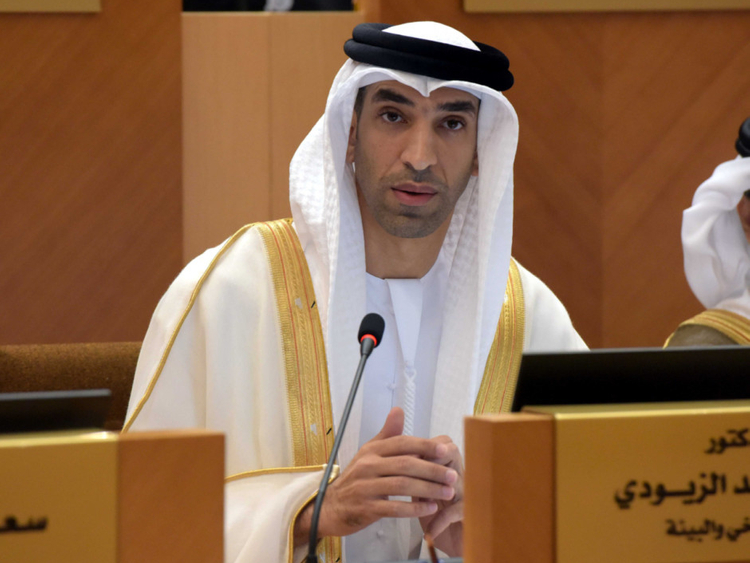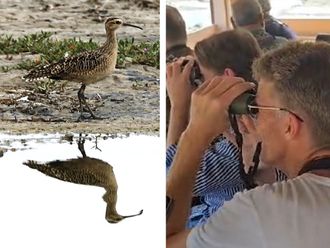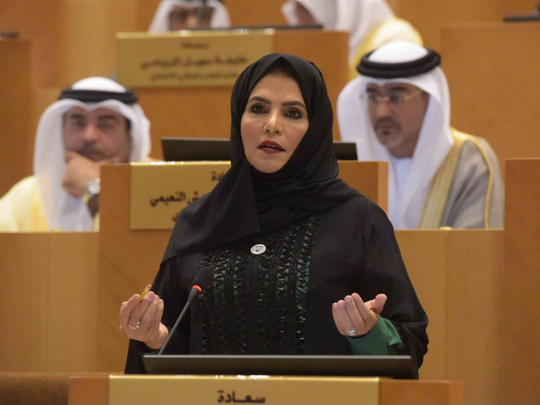
Abu Dhabi: Members of the Federal National Council on Tuesday passed a federal draft law on integrated waste management.
The new legislation regulates managing waste, disposal methods to reduce harm to the environment, cutting the total amount of waste produced and using waste for alternative purposes.
“The new law, the first in the region, is crucial given the fact that the UAE generates more than 6.5 million tonnes of waste per annum,” Dr Thani Bin Ahmad Al Zeyoudi, Minister of Climate Change and Environment told the House.
The UAE’s per capita waste generation is around 1.2 to 1.3 kilogram per day — among the world’s highest, the majority of which or 77 per cent ends up in landfills, the minister told Gulf News on the sidelines of the FNC session. About nine million people call the UAE home.
Dr Al Zeyoudi told the House the UAE’s integrated waste management, which combines a variety of strategies for both waste management and waste reduction aims at recycling 75 per cent of municipal solid waste generated rather than dumping it in landfills.
Waste management involved in integrated waste management are burying waste in sanitary landfills and burning waste in mass burn incinerators.
Integrated waste management also includes waste reduction methods, such as reusing, recycling and composting.
The minister said the law provides for transporting wastes across the country for the first time, which encourages investment in reusing and recycling of wastes.
Members of the House pressed for making the primary prevention of pollution and waste by requiring industries to eliminate or reduce the amount of harmful chemicals used in production, reduce packing materials for products and make products that last longer and are easier to recycle, reuse and repair, the first priority for the Ministry of Climate Change and Environment.
The representatives suggested the second priority should target small businesses and individuals and focus on secondary prevention of pollution and waste. This step involves educating and encouraging people to buy reusable products, repair broken items, recycle, reuse products and compost.
Members of the House demanded the third priority focus solely on waste management, including treating waste to reduce toxicity, burying or incinerating waste and releasing some waste into the environment for dispersal or dilution.
Jamal Al Hai, a member from Dubai, suggested targeting large industry in the private sector to reduce the overall waste produced at the source and relieve the heavy burden of the government.
The draft law, which requires the final approval of the President His Highness Shaikh Khalifa Bin Zayed Al Nahyan, authorises the Ministry of Climate Change and Environment to ban using or importing single use items or products and packaging that are disposed of after one use if they cause harm to the environment.
The bill also authorises the ministry to ban using or importing materials, which are too difficult to dispose of, or its disposal may harm the environment.
Under the bill, the ministry is also authorised to oblige factories to reuse waste generated by them if this is less harmful to the environment than disposing of them.
The draft law obliges factories to reuse, recycle or dispose of their industrial wastes in keeping with standards set by the authorities.
However, authorities will manage hazardous and construction and demolition wastes as well as sewage sludge.
The law sets up a national database for waste.
Offenders face up to Dh1 million fine under the new bill, which will take effect three months after publishing in the official gazette.
FNC member demands assurances organic foods maintain integrity
A member of the Federal National Council sought answers from Dr Thani Bin Ahmad Al Zeyoudi, Minister of Climate Change and Environment, on the authenticity of “organic products” available in the UAE markets.
Azza Sulaiman Bin Sulaiman, a member of the FNC from Dubai, said consumers of organic products want to know that locally-grown and foreign agricultural products maintain their organic integrity from farm to table.
She said consumers buy organic produce because they believe it’s grown locally and without pesticides, but is there any on-site inspections of the local farms and investigation of proper certification of imported organic products so that consumers are provided with reasonable assurance that locally-grown and imported products labelled as organic are from certified organic farms and businesses that produce and sell organic products.
The member warned that the lack of definitive test to identify whether a product is organic or not is the core of the potential fraud, that should be addressed as the UAE places food safety and security at the top of its policy priorities and is proceeding to deliver the highest possible rates for national food security and its sustainability.
She also wanted to know whether imported organic produce was fumigated with prohibited pesticides or not.
Bin Sulaiman affirmed organic is primarily a certification of processes and unless consumers value these processes and trust in the certification system. the integrity of organic industry will be jeopardised.
The member sought answer on whether imported 'organic' foods — especially fruits and vegetables — meet UAE organic standards “If these foods were sprayed with non-organic pesticides, they are not organic. If cows are fed non-organic grains, the milk they produce is not organic. If officials did not conduct on-site inspections of international exporters, and only relied on the word of the exporting country, there is no way to have confidence the crops or goods shipped here are really organic. This means many of our organic products probably do not meet organic labelling requirements. Same goes for any meat, sold as organic,” Bin Sulaiman said.
Bin Sulaiman added this should raise major red flags about the authenticity of these products asking what did the Ministry of Climate Change and Environment do to make sure the organic farms and companies were not misleading consumers.
Bin Sulaiman also put another question about criteria of using chemical fertilisers — a practice may result in the exposure of organic agricultural products to prohibited substances.
The Minister of Climate Change and Environment said the ministry strictly following farmers’ commitment to standards set by the authorities for organic foods.
Organic farms in the UAE and imported organic foods are being certified by the Emirates Authority for Standardisation and Metrology.
90% of UAE’s air to be pure by 2021, minister tells House
High-emission cement, petrochemical and fertiliser factories as well as landfill sites in a six-square-kilometre area stretching across Ras Al Khaimah, Fujairah and Ajman are a health hazard and contribute to environment pollution, a member of the Federal National Council said on Tuesday.
Salem Al Shehi, a member from Ras Al Khaimah, suggested that these facilities be fitted with filters and constantly monitored.
He said residents in Ras Al Khaimah have sought the closure of quarries, crushers and factories that violate environmental laws regarding emissions.
Al Shehi said residents living close to industrial areas in Al Ghail, Naseem, Suhaila and Al Manama have asked that strict monitoring be conducted on cement, petrochemical and fertiliser factories, particularly those with heavy emissions such as cement plants.
Al Shehi said surveillance will be of use only if strict measures are taken against plants whose emissions exceed the set limits.
Laws stipulate that dust-control techniques must be introduced in all quarries and mines, and owners of these factories are obliged to install air-monitoring stations linked to a control centre based at the RAK Environment Protection Authority’s headquarters.
Dr Thani Ahmad Al Zeyoudi, Minister of Climate Change and Environment, said 3,000 scheduled and random visits were made to quarries and factories over the past three years to evaluate compliance with federal environmental laws and regulations.
Dr Al Zeyoudi said 55 quarries were shut down for breaching health and safety regulations from 2014 to the end of May this year. Five cement factories were issued pollution warnings during the same period.
Dr Al Zeyoudi said the monitoring of quarries and stone crushers is meant to ensure that compliance is in line with the 2021 UAE Vision and directives to create a sustainable environment and fully integrated infrastructure.
He added that errant quarries are forced to cease operations for one to three months and cannot resume work at the end of the period unless they meet the necessary standards.
He assured the House that 90 per cent of the air in the UAE will be pure by 2021.


